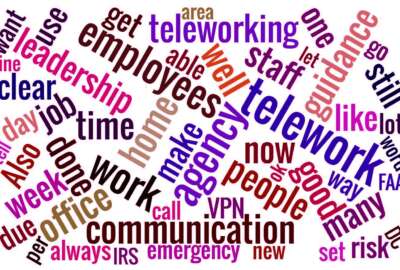What a great time to be in federal work
So many feds are rising to a difficult occasion.
It might sound corny, but an old aphorism applies now: When the going gets tough, the tough get going. That’s my theme for today, the fourth Friday, by my count, since this whole thing moved in like an unwelcome guest that won’t leave.
Across the government, I’ve been talking to people kept out of their offices yet managing to get the job done. More than get it done.
Work can be difficult with a distraction that can just happen to kill you. I think everyone wakes up in the morning, and checks for fever or runny nose, or literally for whether they can smell the coffee. Then they plunge into a day with more than the usual number of unknowns. I’ve had a few 12-hour days myself. Then I think, “I’m working, by Jove!” Seventeen million Americans have applied for unemployment.
Feds are working, and they’re adjusting, improvising, and making do. Many relish the challenge.
Like April Slayton, the director of communications at the Library of Congress. That’s a busier place than you might think. It operates the Congressional Research Service, which serves up answers to requests from members of Congress. It holds public concerts, author talks and lectures. And many other programs.
In fact, because of all of the public interaction, Slayton said Library officials thought it important to not think of having several thousand people telework as simply a continuity of operations exercise, but rather as a way to stay fully functional.
“One of our goals has been to extend beyond our building’s walls more broadly to the public. This has actually been a great opportunity to exercise those muscles.” That is, to provide programming online.
In one instance of improvisation, an author night with John Barry, who in 2005 wrote a book that’s newly relevant, The Great Influenza: The Story of the Deadliest Pandemic in History. (Let’s hope it stays that way.) D.C. philanthropist David Rubenstein interviewed him, each from their respective homes.
For others, the pandemic not only altered daily operation but gave them whole new jobs. Case in point: Dr. Piyush Mehotra had other things to do, as head of NASA’s supercomputing facilities. But events dragooned him and NASA’s machines onto the Covid 19 High Performance Computing Consortium. He’s on a team of federal, academic and corporate experts evaluating research proposals from scientists who will get to use a network of federal supercomputers to do coronavirus research.
Others had to turn things on a dime. I asked retired Rear Admiral Mark Buzby how things are at the U.S. Merchant Marine Academy at Kings Point, joking that’s a place he dotes on like a mother hen. Buzby, the Maritime Administration boss and one of those real can-do guys, said the academy has kept the midshipmen home since the middle of March. Like so many institutions, the academy swung quickly to tele-mode.
Buzby said “Hats off” to the dean, John Ballard (a Naval Academy grad), who shifted the curriculum, none of which existed in online mode before, to online. He and faculty “in the course of about four days, basically converted all of the curriculum to a distance learning format and began teaching it.”
I haven’t talked with Lieutenant General Todd Semonite, commander of the U.S. Army Corps of Engineers lately. But the Corps has been churning out “alternate care facility” construction projects all over, in arenas, hotels, dormitories, convention centers and malls. Now, for instance, the Suburban Collection Showplace in Novi, Michigan, has 1,100 temporary beds.
As a whole, you could argue the government has been uneven in rising up to the sort of crisis few of us have lived through. There was no stockpile of this, the supply of that is old, warnings were ignored, no one at the top could agree. It’ll all be examined, hearings will be held, gotcha points will be made.
But once the giant flywheel starts spinning, it’s hard to stop.
Congress, in its stimulus bill, handed several agencies — notably the IRS and the Small Business Administration — some really complicated and big tasks they weren’t prepared for. The business loan deal is chaotic at the moment. The IRS is finally organizing — with tens of thousands of its own people teleworking — gearing up to send checks. Thousands of unseen employees didn’t create the situation they’re in, but they’re doing what needs to be done.
I recall a beloved high school German teacher. He looked like a caricature of a grouchy burgermeister, but in reality had an eternal twinkle in his eye and an enormous heart. When giving homework, he’s growl, “Arbeit macht das leben suss!” Translation: Work adds zest to life.
No one knows when this will end. If could be sooner, it could be later. It could end and come back again, like the stock market. Whatever the virus does, many feds are finding ways to make that leben suss and help keep the country going.
Copyright © 2025 Federal News Network. All rights reserved. This website is not intended for users located within the European Economic Area.
Tom Temin is host of the Federal Drive and has been providing insight on federal technology and management issues for more than 30 years.
Follow @tteminWFED




